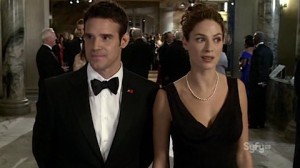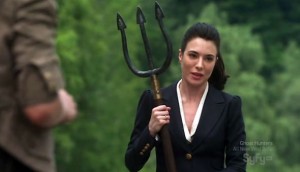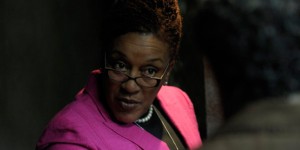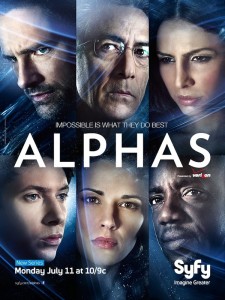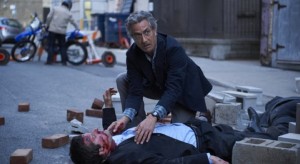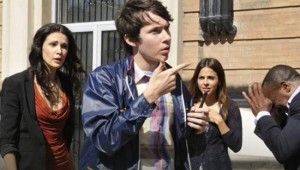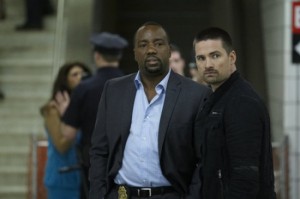 Recently I watched the first three seasons of the Syfy Channel’s Warehouse 13. The upshot is that it’s fun and entertaining, but not necessarily something that will age very well or be particularly remembered.
Recently I watched the first three seasons of the Syfy Channel’s Warehouse 13. The upshot is that it’s fun and entertaining, but not necessarily something that will age very well or be particularly remembered.
There are two obvious shows to reference against: Bones and, of course, The X-Files. In general the show seems aimed at a slightly younger audience than both. It’s not nearly as dark and serious as X-Files mostly was. With the exception of a few weird jokes late in the third season that stick out quite a bit, Warehouse also generally doesn’t have the occasional adult humor and mainstreamed stylish sexyness Bones tries to peddle at times.
It’s kind of funny to watch some of the forced comparisons with Bones in the first couple episodes. Pete, the lead male character, comes across an awful lot like an even goofier Booth. They even look extremely similar. The tone is similar to Bones but without all the blood and unnecessary gross bits. However, somewhat counter-intuitively, I actually find Warehouse a lot more coherent. Bones to me never manages to strike a consistent tone between fantastical goofyness and serious crime drama. By being rooted in precisely that fantastical goofyness, Warehouse actually works better around the viewers’ suspension of disbelief than Bones and a lot of high faux-science procedurals.
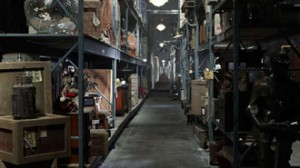
The production pitch is super obvious: Take the last scene from Indiana Jones: Raiders of the Lost Ark, and build a whole show around it. Dunnnzo!
Unfortunately, I would say that Warehouse fairly quickly falls into the same trap that The X-Files continually danced around as it went forward, and eventually more or less fell into: Over-emphasis on long term story arc episodes at the cost of lighter, more fun and comprehensible one-shots. My impression of Warehouse after the second season was actually fairly high. Definitely a light show, but fun and going somewhere. That momentum however really got dragged down in the third season by a steady stream of new characters, unnecessary webs of character relationships and family backgrounds, and an increasingly byzantine overarching story arc—all the same problems of complexity and weight that really plagued X-Files, though admittedly its true strength was the long-term development and complexity of the relationship between Mulder and Scully. It’s a delicate line. Warehouse has a good start on building up a bunch of interesting relationships, but I think launched the plot into the deep end a bit early.
On the upside, the show features a good number of solid female characters. Myka, the female lead, is a bit stereotypical: The organized, controlled and controlling one who’s always just on the edge of emotionally cracking. Otherwise though they’re pretty good. Claudia is the most technologically savvy character on the show. Mrs Frederick is both the consummate boss and fount of wisdom. H.G. (Helena) Wells is a convincing and interesting super villain, and an interesting spin on a historical science fiction touchstone. Leena’s new age trippyness I don’t find particularly compelling but the character’s not terrible when not being used for boob jokes.
As an interesting design point, through the first season and a quarter or so the show has a somewhat unusual triple plot structure. Most TV shows, especially those with an hour long format, run an A plot and a B sub-plot. Until it settles down a bit in the second season, Warehouse often runs an A, B, and C sub-plot, where the A line is about the artifact du jour, the B line about some personal matter or relationship development among Myka and Pete, and the C line some near catastrophe in the warehouse occupying Artie (their boss) and Claudia. These C plots are actually not too annoying and it’s an interesting way to build up the office and tech oriented Artie and Claudia characters before they become more mobile and active in the main plotlines.
For what it’s worth, Warehouse is set in the same Syfy universe as Eureka (which I haven’t seen) and Alphas, which I’ve found pretty decent so far. The tie-ins with Eureka are overt, with characters, gadgets, and companies appearing in both. Connections with Alphas are a lot more implicit at the moment. For example, Warehouse‘s third season character Steve is clearly some kind of Alpha though never explicitly labelled as such, and I would argue Claudia and several other characters show Alpha tendencies as well. It’s a little fun trying to gauge which of Warehouse or Alphas has more budget. I would guess Warehouse, given that it has a lot more setting variety, more gizmos, and actually a fair number of recognizable sci-fi actors. However, I think Alphas is a lot more slick, the relatively more subtle and serious tone of the special effects making them seem more polished. More importantly, the themes in Alphas seem a good bit more mature and deeper.
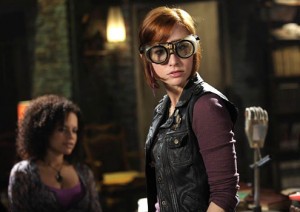
“Listen, just because I was thown in here to compromise between being not-quite jailbait for all the sci-fi dudes, but still young and goofy enough for all the teenage dudettes to relate to, doesn’t mean I can’t kick your ass. Ohmygod, I’m, like, so screwed up, you know?!”
Overall though, Warehouse 13 is a reasonably solid, warmhearted and goofy little science fiction show. It’s probably a bit light for anyone besides teenagers/young adults to really really dig into, but not so much as to be offputting or especially boring. It’s also fairly obvious in nature and execution, and thus easy to have on in the background or to pick up off and on. So, I recommend it for fans of the genre looking for some digested entertainment, just don’t expect too too much.
Finally, Artie, the lead agent, is from Philadelphia… and a curmudgeon. Bonus points for realism!
